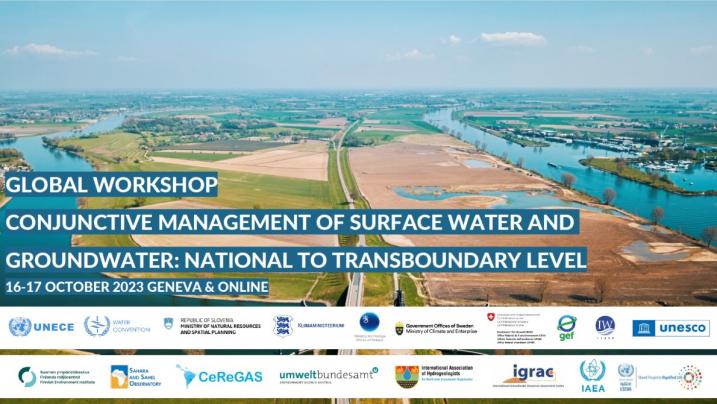Background
Different forms of water are often managed in isolation. Conjunctive Water Management considers surface water, groundwater and other components of the water cycle as one single resource, maximizing benefits and streamlining their use.
The UN Convention on the Protection and Use of Transboundary Watercourses and International Lakes (Water Convention) is dedicated to promoting integrated water resources management, particularly through its Programme area 3: Promoting an integrated and intersectoral approach to water resources management at all levels of the Convention’s programme of work 2022-2024. The Global Workshop on Conjunctive Management of Surface Water and Groundwater: National to Transboundary Level was organized in this programme area with the goal to increase understanding of the interlinkages, showcase good practices, and discuss challenges and next steps related to advancing conjunctive water management in the framework of the Water Convention and beyond.
Partners
The Global Workshop was organized under the leadership of the Ministry of Climate of Estonia, the Ministry of Natural Resources and Spatial Planning of the Republic of Slovenia and UNECE and in partnership with the United Nations Educational, Scientific and Cultural Organization (UNESCO), the United Nations Economic and Social Commission for Western Asia (UNESCWA), the International Atomic Energy Agency (IAEA), the Finnish Environment Institute (SYKE), the International Groundwater Resources Assessment Centre (IGRAC), the Transboundary Aquifers Commission of the International Association of Hydrogeologists (IAH), the Regional Centre for Groundwater Management in Latin America and the Caribbean (CeReGAS), the Sahara and Sahel Observatory (OSS), the Environment Agency Austria (UBA), GEF IW:LEARN and other organizations. The Global Workshop was funded by the governments of Finland, Sweden and Switzerland as well as GEF IW:LEARN.
Objectives
Questions to be addressed during the workshop include:
- Why is conjunctive management of surface water and groundwater useful and what are possible benefits and challenges in its implementation?
- How can conjunctive management be implemented in transboundary settings? How can it foster and advance transboundary water cooperation?
- What are the success stories and lessons learned in implementing conjunctive water management practices in national and transboundary settings?
All related documents for the meeting are available in the table below.
